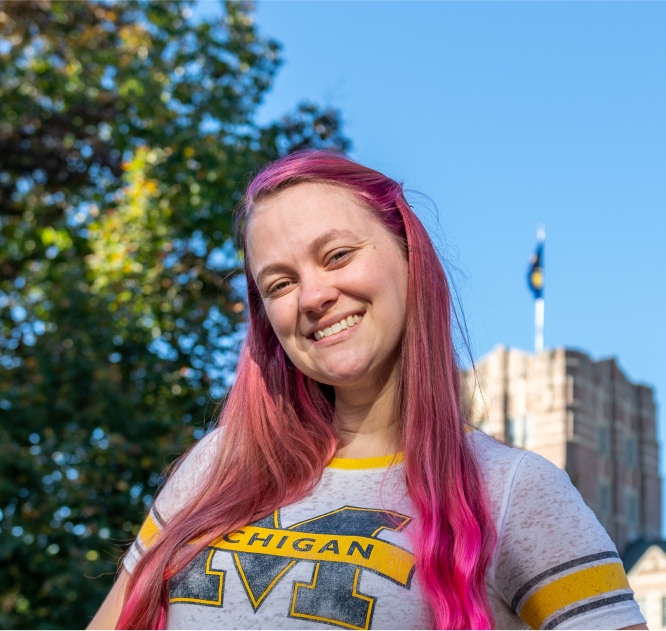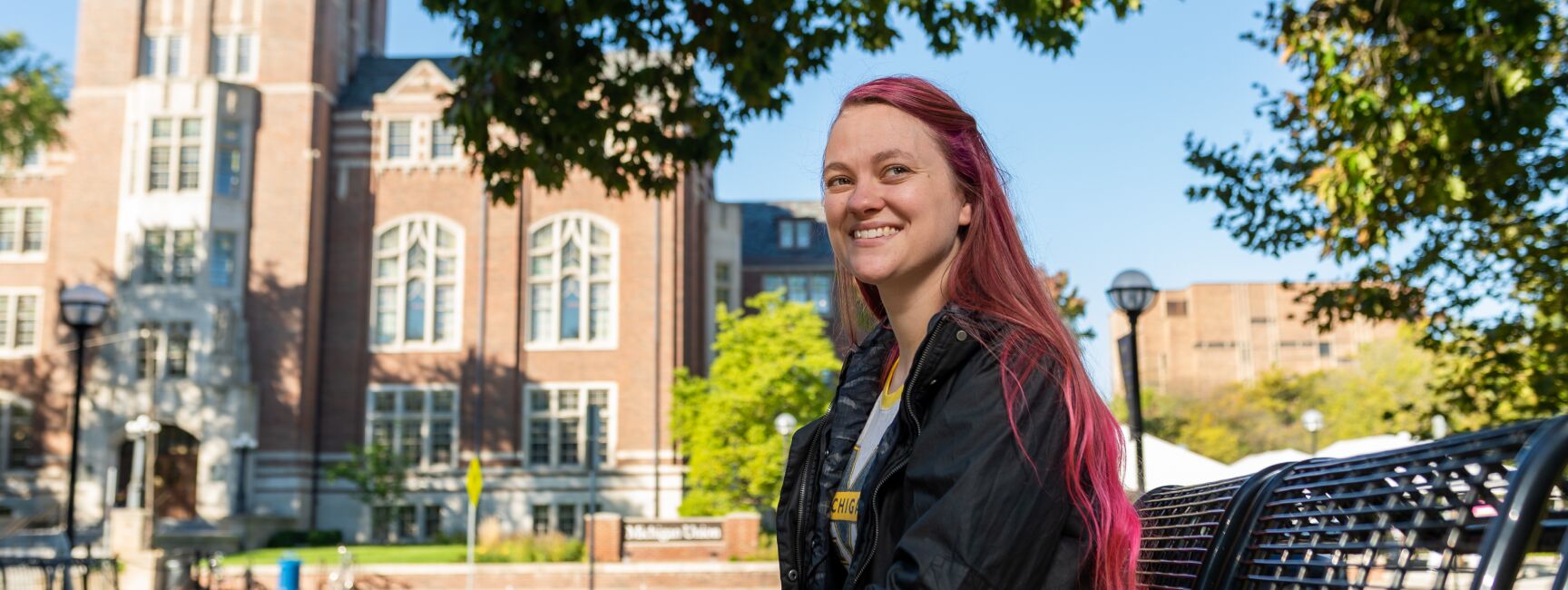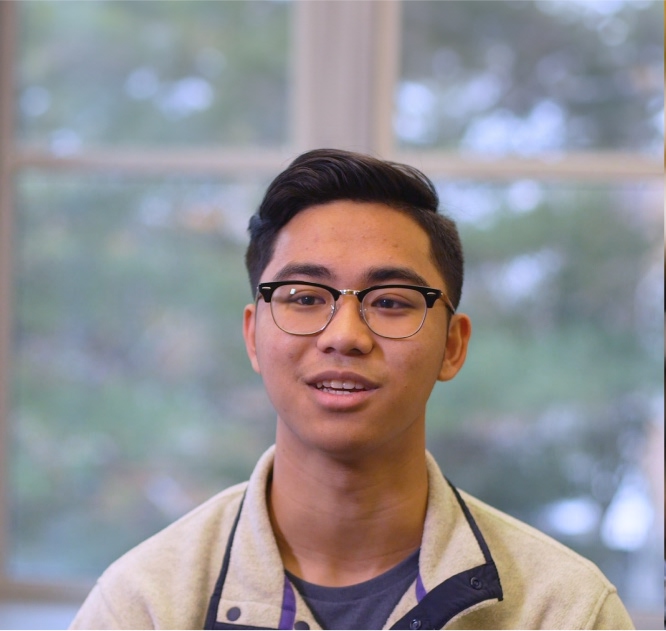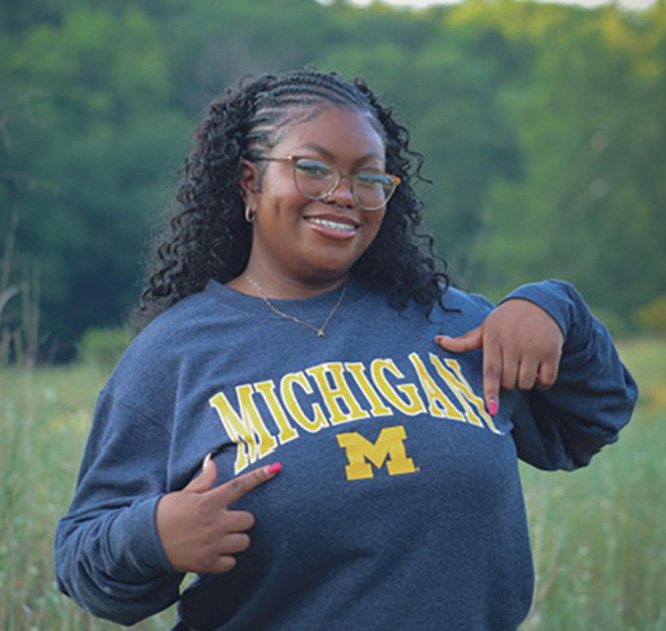
Conquering Challenges
Jessica Engstrom
UM-Ann Arbor Alum
A first-generation student from Coral, Michigan, Jessica Engstrom (LSA ‘22) is nothing short of unstoppable. She has made extraordinary efforts throughout her life to turn challenges into opportunities, every step of the way.
A graduate of the University of Michigan College of Literature, Science, and the Arts, Engstrom majored in psychology. She decided on this major after taking a psychology course focused on education for exceptional children with learning disabilities, more specifically, children with attention deficit hyperactivity disorder (ADHD). “We learned about how to incorporate a range of approaches in the classroom setting to help children with learning disabilities thrive,” she says. “This class opened up a new world for me. It was like a lightbulb switched on in my head. From that point on, I knew I wanted to work with children with learning disabilities.”
A Personal Connection
Engstrom was not unfamiliar with the struggles discussed in the course. “I had a learning disability myself. I was diagnosed with ADHD when I was a young child. There was little understanding around the diagnosis at the time. From eighth grade to my sophomore year of high school, I took medication for ADHD. The medication delayed my physical development. I literally didn't grow and couldn't gain weight. So I got off it when I was 16. I think ADHD is severely overmedicated,” she says.
It was then that Engstrom decided she wanted to learn how to control her ADHD, get it in check, and function without medication. “I found other ways to focus. I completed all my projects one to two weeks ahead of time. I put in twice the amount of work to make sure I was doing everything correctly. I used a lot of calendar reminders for my assignments and quizzes. I also used sticky notes on my laptop if there were important deadlines coming up,” she says.
Embracing Community
In addition to being a student, Engstrom is the mother of a 10-year-old daughter who was diagnosed with an inoperable brain tumor at the age of three. “The tumor presses on her brain stem and cerebellum. My husband and I are happy to say that she's doing great now. She just hit her two-year gap with MRIs, which is a huge milestone,” she says.
As a student-parent, Engstrom juggled her academic studies with her daughter’s medical appointments. She also struggled with her sense of belonging on campus. Seeking community, Engstrom got involved with Michigan Caregivers and Student Parents (MCASP), an organization focused on building and sustaining a thriving community of student-parents and caregivers at U-M.
“Nationally, nearly one in four students are student-parents. It is estimated that there are about 2,000 student-parents on the U-M campus,” says Engstrom. “Becoming part of MCASP changed everything for me. I became an advocate for student-parents, and went on to serve as president of the organization. I’m proud of all of the student-parent programs I was able to create. It was hands-down a huge accomplishment for me. And through this, I found the power of my voice.”
Engstrom now advocates for student-parents on a national level with Ascend at the Aspen Institute, which helps build intergenerational family prosperity and well-being by focusing on children and the adults in their lives together. “I’m a parent-student advisor with the program. It’s a national-level advocacy position that I’ve been part of since I graduated from U-M,” she says. “We are currently funding six other workforce programs to help expand student-parent resources.”
Beginning her Career
Engstrom is now a clinical research assistant at Michigan Medicine. In this role, she works with the U-M Institute for Firearm Injury Prevention (IFIP), which collaborates with communities and harnesses the research power of U-M, one of the nation’s largest public research universities, to address the root causes of — and potential solutions for — the most important issues surrounding firearm violence.
She serves on two of the IFIP studies: SynERgy, a study focused on violence intervention for adolescents seeking treatment in urban emergency departments for violent injuries; and IntERact, a study focused on behavioral intervention for youth seeking treatment in an urban emergency department who reported three-month firearm carriage and smartphone ownership.
Gun violence is the leading cause of death among children and teens in the United States. “Our team collects data months after the intervention period to see how it impacts adolescents receiving the intervention, and if we can reduce carriage and violent injury,” she says.
Grateful for Support
As Engstrom looks back on her accomplishments, she notes that none of it would have been possible without the Go Blue Guarantee. “The Go Blue Guarantee changed my life,” she says. “This support is the only reason I was able to get my education. It was a lifesaver.”
And now, Engstrom’s work will go on to help the lives of many.



